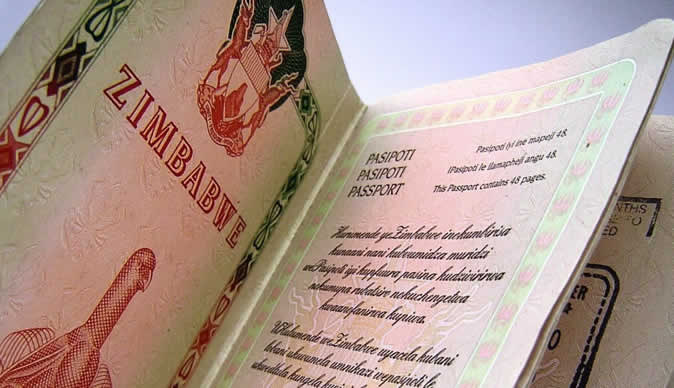The new passport fees announced by the government Wednesday are beyond the reach of many poor Zimbabweans, analysts have said.
An ordinary passport now costs US$60, a three day passport US$200 or ZWL$ equivalents with emergency 24-hour passport remaining at US$318
Announcing the new passport fees, Information, Publicity and Broadcasting Services Minister, Monica Mutsvangwa, said foreign currency was required for the off-shore procurement of consumables, adding fees payable in the local currency were no longer viable with the production cost for a single passport pegged at US$58.55.
She said in addition, the Treasury would provide US$4.5 million to purchase the required equipment and consumables.
Effie Ncube, spokesperson for National Consumer Rights Association (NACORA) said the travel document remained beyond the reach of many.
“The recent steep rise in the cost of passports is a disgrace to say the least,” said Ncube.
“This is a government which does not live in the reality of a collapsed economy that Zimbabwe is. No one. It’s only a few people, them and their children, the one percent in the country that can afford passports that are costing that much. So this is a government that is completely out of touch with reality, the lived realities of the millions of Zimbabweans, the overwhelming majority of Zimbabweans.
He said the new fees would not improve the availability of passports or lead to the reduction of queues at registry offices.
“If at all it will only result in the exclusion of the majority of people who want to have passports, who deserve to have passports,” said Ncube.
“The government is simply making it impossible for people to acquire passports. So millions of Zimbabweans are just going to sit at home without passports.”
He added that Zimbabwe’s problems were as a result of a failed political leadership that has run down the country since independence.
“Obviously from an ordinary man’s point of view it would seem that these prices are exorbitant given a situation where the price of an ordinary passport is almost half or so of a civil servant’s salary and the three day passport and emergency passports are way beyond the salaries of most people or beyond what many make on a daily basis given that most Zimbabweans are self-employed,” said Sipho Nyoni, a social commentator.
“A passport should be very affordable and easy to access and every person should have a right to a passport at a cost affordable to them just as they have a right to a national ID at almost no cost but of course am aware that realistically we are still far from such a scenario given our economic situation.”
He said the new prices should see queues being reduced at many registry offices considering not everyone would be able to afford them and authorities will be having easy access to foreign currency.
He added there was a need to further decentralise the production of passports and stemming out rampant corruption at the registry offices.
“The adjustment of passport fees was now long overdue; it is the acceptance of the exchange rate reality prevailing on the market,” said Vusumuzi Chirwa, another social commentator.
“Remember at one point the rate was 1:1 meaning that an ordinary passport either ZWL$53 or US$53, now considering the depreciation of our local currency it means that prior to these new fees, the ordinary passport was now costing only US$1 or R15 which was no longer feasible taking into cognisance the passport production costs.”
He said the new fees have the potential to speed up the processing of passports upon applications, provided they are not diverted to clear the backlog.
“In line with devolution provisions of the Constitution, the issuance of passports should be devolved to district offices from provincial offices,” said Chirwa. “Furthermore passports should be applied for online.”
Spokesperson for the Zimbabwe Community in South Africa, Bongani Mkwananzi, said an ordinary passport was competitively priced.
“Feedback from the ZimCommunitySA diaspora community is that at $60 which at today (Thursday)’s rate converts to R871, the passport is competitively priced and as much as this is a high figure especially looking at the lock-down circumstances with many losing their jobs, it is still priced within reachable means,” said Mkwananzi.
“The emergency passports which are now being resorted to by many in hope of renewing their passports before 31 December where all Zimbabwe Exemption Permits (ZEP) permits expire is still overly exorbitant seeing that the material used for production would be the same. Perhaps pegging the fees from $60 for normal term, $120 medium term and $180-200 fast term sounds reasonable.”
He added that the government should not be seen to be making profit out of the public service.
“Experience has taught us that the production of passports is not being attended to with the urgency which it needs,” said Mkwananzi.
“We still have people waiting for their passports for a long time with some even saying since 2019! We do not foresee a reduction of queues or the expedient production of passports. In essence the demand for passports grows without the fixing of the core issues forcing people to emigrate, which are both economic and political.
He said as part of measures to ensure Zimbabweans get passports hassle-free, The Zimbabwe Community in South Africa requested and pleaded for the streamlining of the different departments to have a one stop process at the Embassy and Consulates where the filling, submission and collection of forms happens at one centre but that has not happened.
“Such shocking ineptitude and failure to deliver is synonymous with our government and we really no longer get surprised,” he said.

